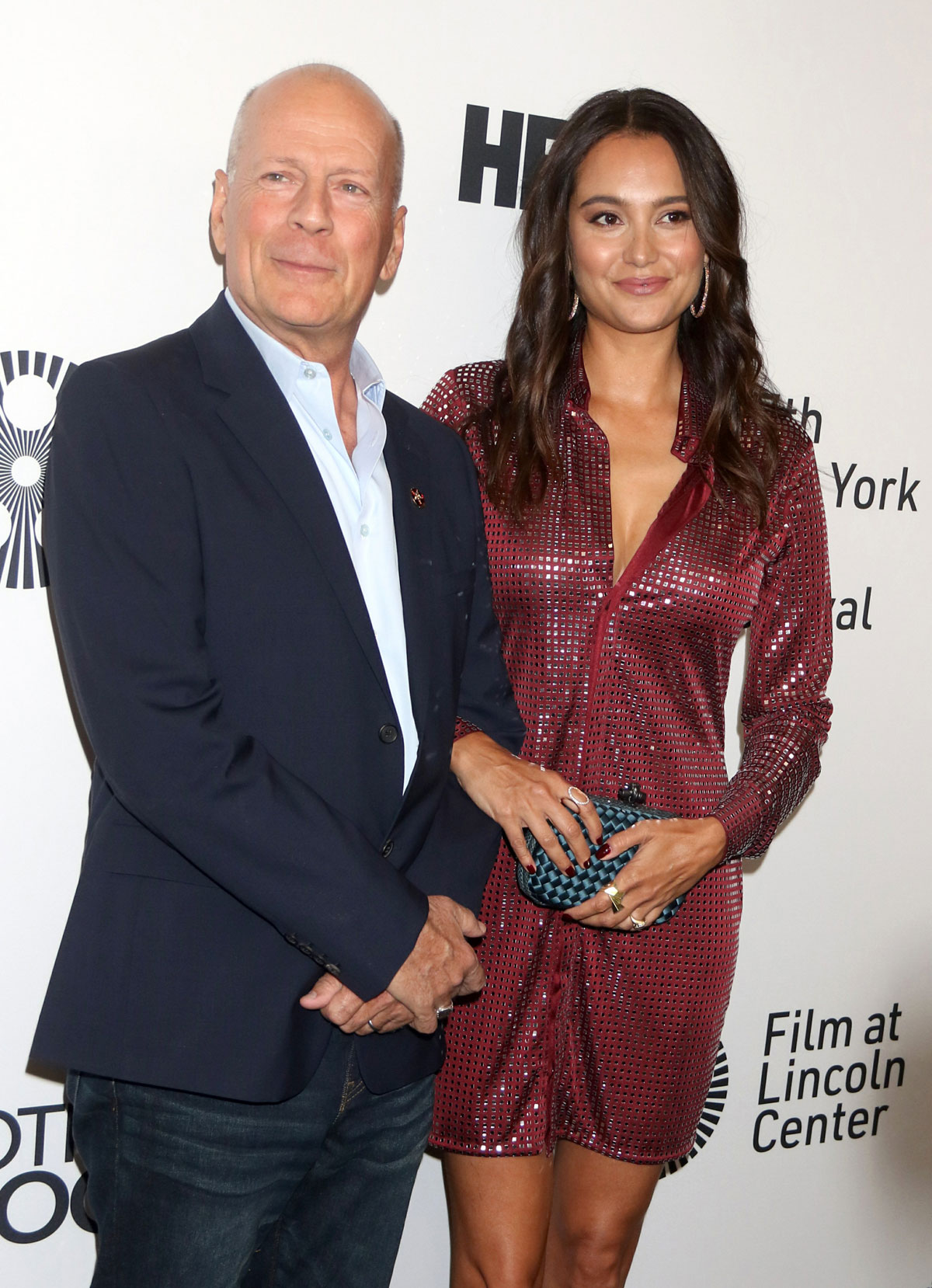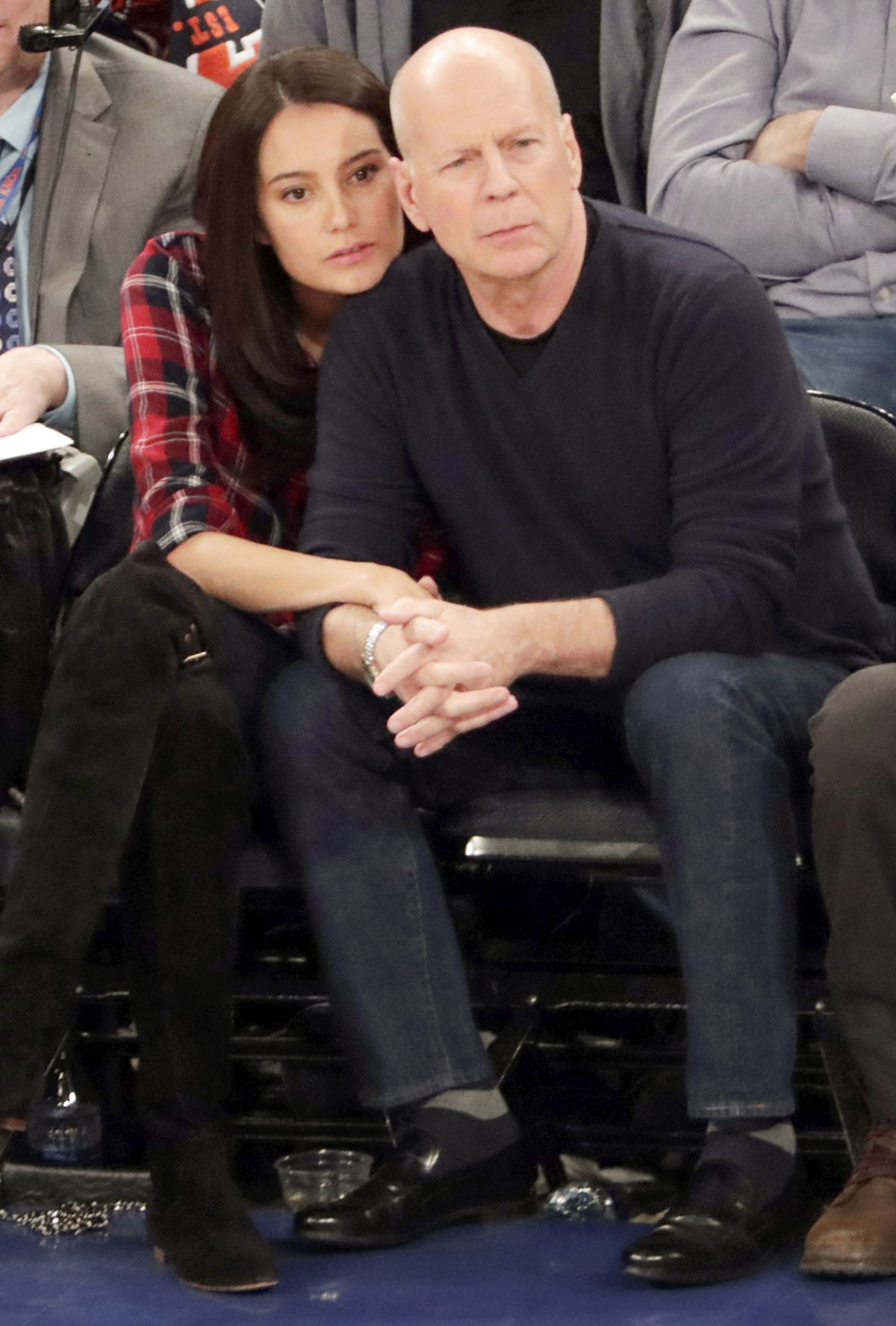
World Frontotemporal Dementia Awareness Week began on September 24, which is why Emma Heming Willis appeared on the Today show yesterday. Emma has been married to Bruce Willis for fourteen years. For nearly the past two years, being Bruce’s wife has included being his “carepartner” — a term she prefers to “caretaker,” because they’re still partners — since his 2022 diagnosis of aphasia that progressed to FTD earlier this year. In tribute to Bruce, Emma has decided to break out of her natural comfort zone to be a public advocate for FTD Awareness Week, a step she gives complete credit to “the power of Bruce.” Today host Hoda Kotb and CEO of the Association for Frontotemporal Degeneration Susan Dickinson supported Emma with kindness and compassion during the emotional segment:
Bruce Willis’ wife, Emma Heming Willis, is speaking out about the actor battling frontotemporal dementia, and whether he fully understands his diagnosis and deteriorating condition.
“Hard to know. It’s hard to know,” an emotional Heming Willis told NBC’s Today show Monday as she added it was both a “blessing and a curse” for the mother of two to receive and ultimately accept his diagnosis.
“It’s hard on the person diagnosed, it’s also hard on the family. And that is no different for Bruce, or myself, or our girls. When they say this is a family disease, it really is,” she added in a conversation with Today co-anchor Hoda Kotb.
The Willis family publicly revealed in 2022 that the 68-year-old Pulp Fiction star was diagnosed with aphasia and was retiring from acting. After sharing that his condition had progressed to a dementia diagnosis earlier this year, Heming Willis, a mother of two, has become an advocate for World Frontotemporal Dementia Awareness Week, which kicks off Monday.
Susan Dickinson, CEO of the Association for Frontotemporal Degeneration, who also appeared on Today, said the devastating disease in some people takes away their ability to understand their deteriorating health condition. Willis’ neurological disease impacts his memory, language processing and communication abilities, among other health effects.
“It can affect speech, behaviors, personality and what we call executive functioning,” Dickinson said of the condition that has no cure. Willis and Heming Willis were married in 2009 and have two daughters, Mabel (11) and Evelyn (9).
Willis also has three adult children from his prior marriage to Demi Moore: Tallulah (29), Rumer (34) and Scout (31).
I’ll be honest, I pretty much sobbed through the entire video clip. But I also watched it through the lens of being one month out from my father passing. My father did not have FTD, but we had difficult moments with him at the end where his mental capacities were diminished. There is a very peculiar pain in witnessing a beloved family member morph into an infantile state. I will never forget my mother and I having to remind my father repeatedly that he could have one ice chip at a time, but he couldn’t drink water because the doctors were worried about him choking. As soon as we’d finish explaining he would ask the question again, it never stuck. The worst visual, though, was seeing his hand wrapped in an adult-size equivalent of a baby mitt to stop him from trying to pull out an IV in the other arm.
The beauty of Emma’s appearance yesterday was in that she was poised and articulate, but at the same time vulnerable and visibly feeling her grief. A month ago she commented on Instagram that she was “not good,” but making choices to find joy. As she did in that post, I continue to appreciate Emma showing up exactly how she is, even when it’s “not good.” She is also still consciously choosing to look up towards all the good things happening in their family, because good things are still happening amid Bruce’s FTD. Like I’ve said before, these moments hit you as every emotion, everywhere, all at once.
World Frontotemporal Dementia Awareness Week runs through October 1 — you can learn more about FTD here.
Photos credit: Roger Wong/InstarImages, Backgrid and via Instagram












It takes bravery and strength to put yourself out there for a cause, especially one that’s not “trendy” like say, breast cancer (everyone loves to wear pink in October for example). To tell the public that your life is no longer in your own control, but rather dictated by a brutal and unpredictable disease, even in a care taking role. Especially when the one stricken by the disease, Bruce Willis in this case, has an image that was carefully cultivated over decades, and this runs counter to it. This is human. I admire her.
So sorry for your loss, Kismet.
I feel for Bruce’s kids, especially the young daughters. And Emma too, that’s so much to deal with. I hope his life is as peaceful as possible for all of their sakes.
Same here. She did GREAT! You can see her heartbreak but she came out and did the thing like a boss. Respect!
What a horrible disease.. Bruce came across so quick witted, with a great sense of humor, and charismatic that it makes his condition even more heartbreaking.
Dementia is so heartbreaking, to see your loved one disappearing before your eyes. The support services available to assist families is pathetic. I am a social worker in an acute care hospital in a rural community. Often families bring in their loved one to the emergency room and beg for help because they are at wits end. I have seen little elderly women turn violent at the least little stressor. There are little to no supports available, at least in our area, to help those with dementia stay in their home and educate family in how to care for them.
This is a horrible disease. I worked as an aide in an Alzheimer’s facility years ago. I know it’s not the same disease but the memory loss is devastating to the families. They come to visit and their family member doesn’t recognize them and so lots of them just stopped visiting. I had a patient who one day I was at one end of the hall and she was at the other end and I waved to her and said hello to her and she looked at me and smiled and said Hello Sue. I ran up the hallway and gave her a hug when I noticed her daughter come out of her room. She smiled and told me that she was glad that she recognized me by name and hoped that her mother one day would be able to do the same and recognize her by name. I told her I hoped she would too and went back to where I was going and quietly cried. Memory loss for the families is just rotten.
Poor woman, my heart goes out to her. Bruce Willis is still quite young, and it’s devastating to have to go through this with him and his young children to have to see it also. My husband’s grandmother’s battle with Alzheimer’s completely took over our lives (as we are a small, close-knit family), even with her being in a care facility. Even with someone taking care of their daily needs, you always need to be there, always advocating for them, keeping them calm and happy. It’s been four months since her death, and my husband and mother-in-law are now exhibiting physical signs of the long-term stress they have been under for the past four years.
This was so sad, but I’m very moved by her willingness to turn the family tragedy of a loved one’s decline to dementia, which is one of the worst ways for a family to lose someone, into powerful public awareness of a disease that is not widely known or talked about, but that her platform as Bruce’s wife gives her to talk about on these shows.
I was with my gramps when he was given the dementia diagnosis. And just that, no support, no information on how we could support, nothing. I watched my eighty years old grandma care for him as best as she could, I watched my mom support them, I watched them break. I did what little I could when I went to visit them. I remember the funny moments, the tender moments when he was the gramps I knew from childhood, when he told me stories I knew and others I hadn’t heard before. I remember that moment way past midnight when he was getting ready to go to work and the look on his face when it dawned on him that this wasn’t right. I remember being told that in a moment of confusion, he’d become violent towards gran. Fuck dementia.
Listening to the stories again and again is so worth it. Sometimes they’ll take a left turn and go in a completely new direction that you’ve never heard before and then it becomes a new story just like that.
However, if I develop dementia or alzhemier’s, I don’t want to be around for it. No thanks. Stick a fork in me, I’m done. Seen it too much to be willing to walk down that road myself.
Heartbreaking.
There is a special pain that comes with having to protect a formerly strong person from accidentally hurting themselves or others. We did get lucky with the horrible “taking the keys away” fight. My husband is from a small town. When we became concerned about my father in law’s driving my husband went to the local sheriff who took the time to do some surveillance. He then went to see my father in law and told him that he was removing his driving privileges, and took his keys. My father in law was still furious at us for not returning his keys, but we were able to blame the sheriff.
Even with all the money and top resources at your disposal, this is hard and good on Emma for coming forward and saying so.
We need even more people advocating and educating about dementia. The toll on the patient, the caretakers (usu. family) is immense and we aren’t prepared at all for it! When my mother got her diagnosis, the doctor talked to us, dismissed us, and sent us on our way. No resources. No help. No support. Dementia care is SUPER expensive, and we as individuals and as a country are not prepared for the BOOM that is coming as the boomers continue to age into those dementia years. We need change on a policy level here in the US, but the rich, white, men, with excellent healthcare and pensions, just don’t care.
1000% ALL of this. It is a devastating diagnosis and families are left with no real resources unless they are wealthy.
When my mom began exhibiting dementia symptoms after the start of the pandemic, we were lucky enough to have available help from family members. A cousin of mine owns a senior care agency and generously offered her services to support our mom so she could remain supervised in her home until she passed away late last year. Without her help, I don’t know how else we would’ve managed. Sadly, many others aren’t so lucky due to the pathetic lack of care for our elders in this county.